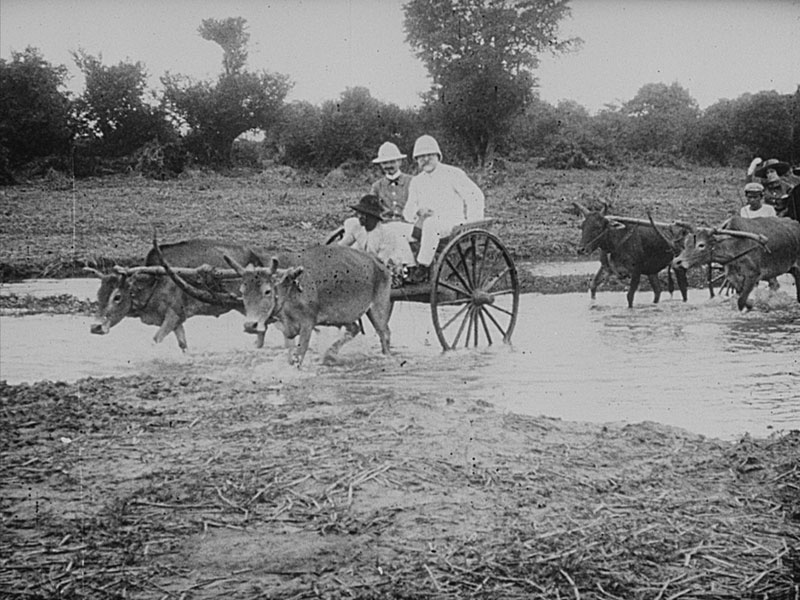For his latest documentary, filmmaker Rithy Panh decided to leave it to the viewer to draw their own conclusions, so he created a film with no spoken soundtrack.
“One must let the image speak,” he said in an interview Friday. “If one speaks for the images, this process of grasping by one’s self, of this historical echo being understood, does not work properly.

“Instead when you, the viewer, sit down and watch the film…you will create the commentary based on who you are.”
So Mr. Panh—whose film “The Missing Picture” won one of the two top awards at the 2013 Cannes Film Festival and was among five Oscar finalists in the foreign-language film category last year—made a silent movie.
The soundtrack consists of original music written by French composer Marc Marder. And a few lines of French text appear here and there on panels, silent-film style, along with English subtitles as the historical footage unrolls.
Due to be shown in Phnom Penh for the first time this month, “La France est notre patrie”—or its English title, “France is Our Motherland”—the film starts with gentle images of a large home engulfed in greenery, the forest having long ago reclaimed the place.
Then the era during which this house was filled with people comes to life: the world of France’s colonies in Cambodia, Vietnam, Laos and Africa.
This world is presented through the lens of those who held the camera, some of them French officials or business people, others French residents or tourists wanting images to show friends and families.
While some of the Cambodian and Vietnamese people filmed were willing to comply, others obviously saw this as an intrusion and soon turned away from the cameras.
A reflection on the colonial era? Yes, but as one woman told Mr. Panh after seeing the film, “Nothing has changed.”
Some of those shots might have been taken by today’s tourists visiting “exotic” locations and photographing people without asking permission.
And a few scenes of deforestation and development in the mountainous regions of Cambodia or Vietnam could have taken place today—give or take a few details—with local developers or foreign investors replacing the French.
At times, the colonials are pathetic in their clumsiness. Two women of the early 1900s throw coins at the “natives” to encourage them to elbow each other out of the way to grab the treasures, and two hunters are shown being assisted by numerous hill-tribe hunters then later proudly posing with “their” catch.
There are images of daily life, with colonials smiling among their Cambodian employees, promotional scenes of French doctors or technicians training staff, and rubber plantation workers.
And there also are images of French men at a brothel selecting Indochinese women dressed only in their underwear, commenting on the various merits of Cambodian and Vietnamese women.
All this is interspersed with short bursts of text either borrowed from or inspired by French films of the time and promotional material on France’s accomplishments in its colonies.
This includes a few lines by a Dr. Legendre, who wrote: “All major developments in world history have been the work of the white race, the only creative one among all others.”
The film ends with 1950s scenes of French soldiers carrying dead comrades as France is losing the war against North Vietnam’s communist forces—the end of French colonialism in Indochina.
The 119-minute documentary took more than two years to complete.
It was inspired by the refusal in Europe and Australia to accept refugees, a situation which has at times led to violence, Mr. Panh said.
“No one wants to take responsibility, to take care of this,” he said. “One does not ask to take on other’s difficulties but simply to show solidarity, to share [responsibility] for these populations in difficulty.”
After all, some of these populations are fleeing to the West in part because their countries’ resources have been exploited by others, he said.
This prompted Mr. Panh to look at the way powerful nations have viewed weaker ones in the past, how colonial powers such as France saw the people from the countries they were controlling.
“Colonial nations tend to consider others as having no civilization, no history,” Mr. Panh said.
“Globalization entails the same thing, actually,” he added. “In the end, it’s the weak who always remains weak, gets the crumbs …Most of the time, one’s cultural standpoint is not respected.”
The film has already been presented at several international film festivals since its release earlier this year. It will be shown on May 25 at the Institut Francais in Phnom Penh.




